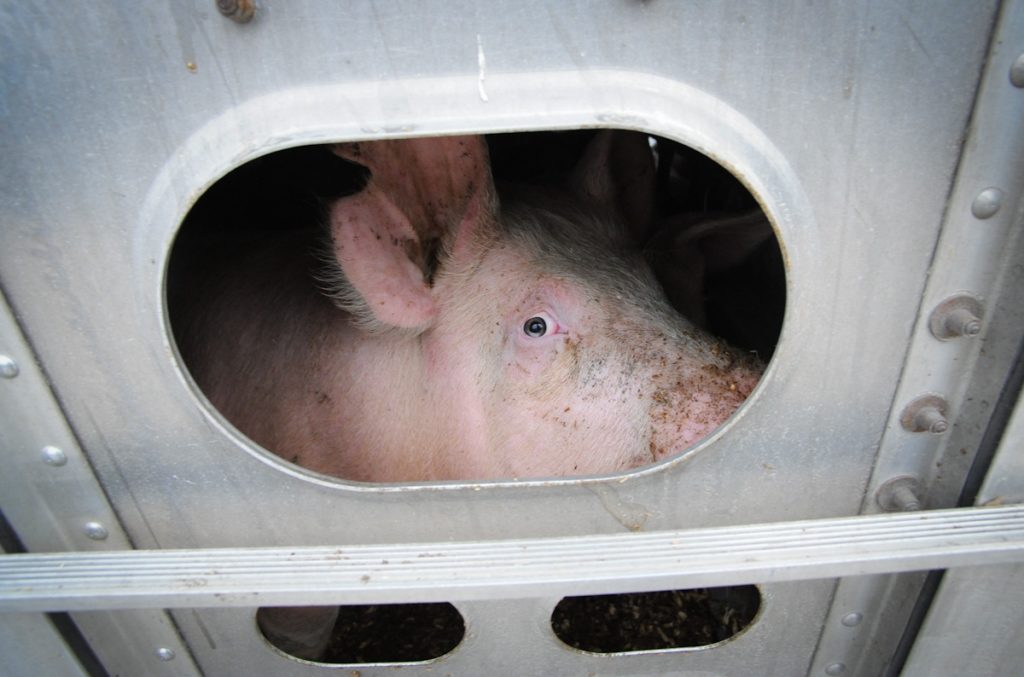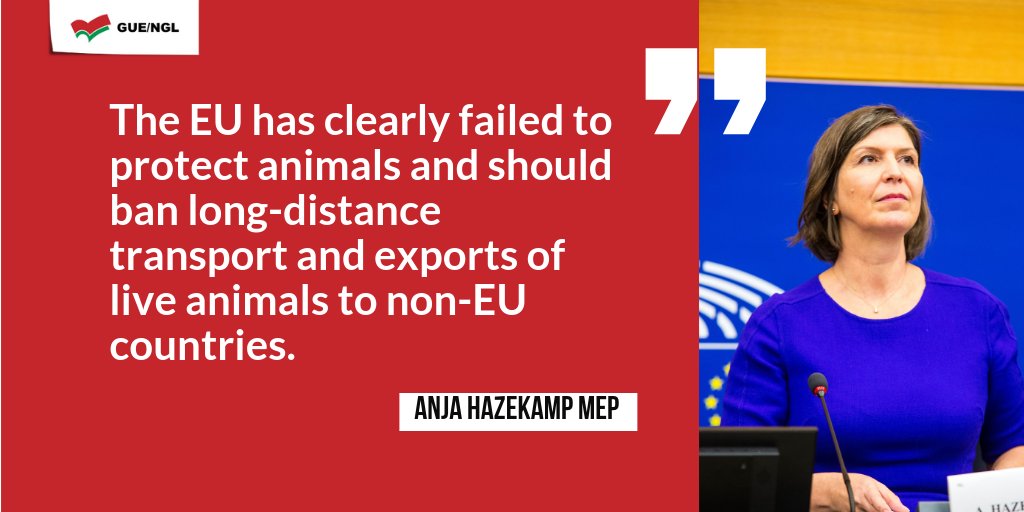Una vez más, éxito europeo para el Partido por los Animales: transporte animales se acorta, mejores inspecciones y sanciones más duras
Transport time of live animals must be shortened, it is no longer permitted to bring animals to countries which do not meet European animal welfare standards and violations of the European Union’s (EU) animal transport rules must be dealt with more severely. This was advised in a report by the Agriculture Committee of the European Parliament last week, also at the initiative of the Dutch Party for the Animals.

Scared pigs during transport (Jo-Anne McArthur, We Animals)
The so-called implementation report on animal transports by the Agriculture Committee says that transports with live animals – which can now take days to weeks – must be shortened. Better checks should be made on compliance with the rules issued by the EU to protect animals during transport. Carriers who do not observe those rules, resulting in serious animal abuse, must be sanctioned more severely and more consistently; for example by vehicle impoundment. Additionally, animals should no longer be transported to countries outside the EU if compliance with animal welfare rules cannot be guaranteed.
The implementation report was produced, also at the initiative of the Party for the Animals, in relation to serious and structural malpractices during animal transports in and from Europe. Party for the Animals MEP Anja Hazekamp also negotiated on the Agriculture Committee’s recommendations. “Better inspections and heavier sanctions for incorrect animal transports are urgently needed. It is of great importance that animal transports are dealt with in practice and not just on paper.”
European Commission refuses to protect animals

Party for the Animals MEP Anja Hazekamp
Animal protection organisations have submitted two hundred detailed reports to the European Commission since 2007. These state how animals are loaded onto overcrowded lorries, are often not able to stand up, and are transported in extreme temperatures. The reports also contain evidence of sick and wounded animals being transported, animal abuse, and lack of water facilities.
“All these malpractices are against EU regulations, yet the European Commission never took any action to better protect animals during transport. It is a disgrace,” according to Hazekamp.
Last summer, the MEP travelled to Croatia and Slovenia to inspect animal transports.
“The transports where animals were transported to countries outside the EU are the longest and the most horrendous ones. After travelling through Europe for days, the animals are transferred, often heavy-handed and in extreme heat, to ships with destinations far outside the EU. As soon as the animals cross the EU border, no one is concerned with their condition or feels responsible for their well-being. It is not just cruel – after all, they are live creatures who are conscious and have feelings – but it is also against the decision of the European Court. It stipulates that animals should be protected according to European regulations during their entire journey. This cannot be guaranteed at all, so for that reason transports to countries outside the EU must be prohibited,” according to Hazekamp.
Next to the recommendations approved by the Agriculture Committee last Thursday week, the Party for the Animals made more proposals. “For example to prohibit the transport of unweaned animals, such as two weeks’ old calves. In addition, we want to drastically reduce the number of animal transports. This can only be achieved if we keep fewer farmed animals and produce more locally. The Agriculture Committee did not agree.”
On the 14th of February next, the full European Parliament will vote on the Agriculture Committee’s recommendations in Strasbourg.
El transporte de animales vivos debe acortarse, los animales ya no pueden transportarse a países que no cumplan con las normas europeas de bienestar animal y las violaciones de las normas de transporte animal de la Unión Europea (UE) deben tratarse con mayor dureza. La Comisión de Agricultura del Parlamento Europeo informó esto la semana pasada en un informe, entre otros por la iniciativa del Partido Holandés para los Animales.

Cerdo aterrorizado en el transporte (Jo-Anne McArthur, We Animals)
El llamado informe de implementación sobre el transporte de animales del Comité de Agricultura establece que los transportes con animales vivos, que ahora pueden demorar de días a semanas, deben acortarse. También es necesario comprobar de mejor forma si se cumplen las normas de la UE sobre la protección de los animales durante el transporte. Los transportistas que no cumplen con las reglas y causan un grave sufrimiento animal, deben ser castigados más duramente y de manera más consistente; por ejemplo, con la incautación de sus vehículos. Además, los animales ya no pueden ser transportados a países fuera de la UE si no se garantiza el cumplimiento de las normas de bienestar animal.
El informe de implementación surgió, en parte por iniciativa del Partido por los Animales, en respuesta a los abusos graves y estructurales durante el transporte de animales dentro y desde Europa. La eurodiputada del Partido por los Animales, Anja Hazekamp, negoció las recomendaciones con el Comité de Agricultura. «Se necesitan urgentemente mejores controles y sanciones más severas para el transporte de animales inadecuado, pero ahora es de gran importancia que las reglas para el transporte de animales se aplican punamente en la práctica y no sólo en el papel.»
La Comisión Europea se niega a proteger a los animales

Anja Hazekamp, europarlamentaria del Partido por los Animales
Las organizaciones de protección animal han proporcionado doscientos informes detallados a la Comisión Europea desde 2007. Estos muestran cómo los animales se cargan a los camiones abarrotados, a menudo no pueden pararse y son transportados a temperaturas extremas. Los informes también contienen evidencia de transporte de animales enfermos y heridos, maltrato animal y falta de suministro de agua. «Todos estos abusos violan las normas de la UE, pero la Comisión Europea nunca ha tomado medidas para proteger mejor a los animales durante el transporte, lo que es una gran vergüenza,” dice Hazekamp.
El verano pasado, la eurodiputada viajó a Croacia y Eslovenia para revisar el transporte de animales.
«Los transportes en los que se llevan a los animales a países fuera de la UE son los más largos y los más horribles. Después de estar días en la carretera en Europa, los animales a menudo son transbordados, a menudo con mano pesada y en condiciones extremas de calor, en barcos con destinos fuera de la UE. La frontera de la UE ya no se revisa en absoluto y nadie se siente responsable. No sólo es algo cruel, considerando que son de seres vivos con sentimiento y conciencia, sino también se incurre en violación de una declaración del Tribunal Europeo que estipula que los animales deben protegerse de acuerdo con las regulaciones europeas durante todo el viaje que realizan. Esto es imposible de garantizar, por lo que se debe prohibir el transporte a países fuera de la UE,” según Hazekamp.
Además de las recomendaciones aprobadas por el Comité de Agricultura el jueves pasado, el Partido por los Animales había hecho otras propuestas. «Por ejemplo, para prohibir el transporte de animales destetados, como los terneros de 2 semanas de edad y queremos reducir drásticamente el número de transportes de animales, lo cual solamente es posible con menos animales de granja y más producción local. El Comité Agrícola no lo aprobó.»
El 14 de febrero, el pleno del Parlamento Europeo en Estrasburgo votará sobre las recomendaciones del Comité de Agricultura.